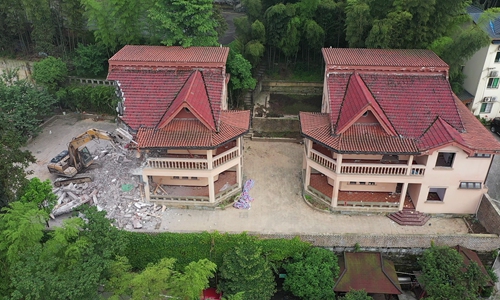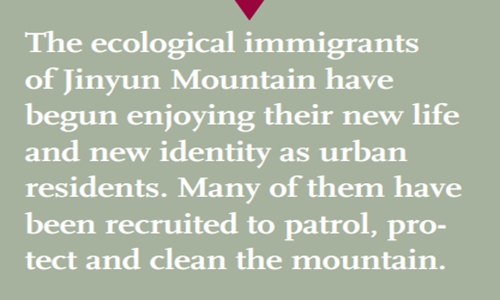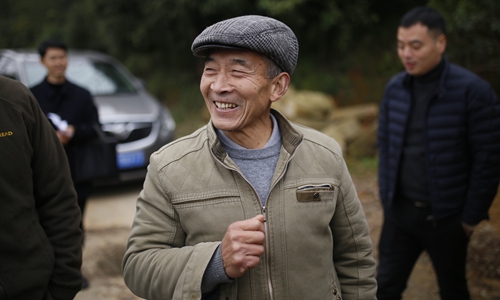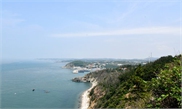IN-DEPTH / IN-DEPTH
Southwest China natural reserve clears illegal buildings, residences for environmental protection
Greening the mountain

Illegal buildings are demolished in the Jinyun Mountain, Southwest China's Chongqing Municipality. Photo: Courtesy of Chongqing forestry administration
To recover the ecology of a mountain national reserve seated in Southwest China's Chongqing Municipality, original residents on the mountain moved out and illegal constructions were demolished amid a national environmental campaign.Li Xinghua's old house had the best view on Jinyun Mountain. The 55-year-old farmer did not remember how many generations of his family had been living there, but felt firmly rooted in these parts.
From the house, nestled deep in mountains and hills, one could enjoy the stunning view of bamboo woods and serene mist common in Chongqing's countryside.
It's easy to see why Li wanted to develop the area into a tourist attraction. He spent seven years reconstructing his house, which became a four-floor hotel with an area of 973 square meters.
But Li's enlargement and renovation of the house was illegal. The area of the house surpassed the acceptable maximum of 700 square meters.
Li's house was in the core region of the Jinyun Mountain National Natural Reserve, where there should not be residential or any other human activity aside from permitted scientific investigation.
Jinyun Mountain is home to 2,407 plant and 1,071 animal species, including one of China's best subtropical evergreen broad-leaved forest system, "treasure of genes."
"The Jinyun Mountain is the ecological guard of the Chongqing city," said Zhou Xu, secretary of the CPC committee of Beibei district, Chongqing. "In the regions on the same latitude, Jinyun Mountain has richest natural resources."
The Jinyun Mountain National Natural Reserve was established in 2001. More scenic areas encircle the reserve's 76 square kilometers, and under the mountain is downtown Chongqing, China's largest municipality with a population of 31 million.
More than 8,800 residents called the reserve home. In its core area and buffer area, there were more than 300 households.
"The aborigines lived here long before the scenic site and national reserve were set here, which brought difficulties in the administration," Zhou noted.
It is hard to balance people's daily lives and commercial activities with ecological protection. Illegal commercial buildings, such as restaurants and hotels, attracted tourists and made a bigger environmental footprint, according to a statement from Chongqing's forestry administration.
In May 2018, the central environmental inspection in the region indicated that 105 households and nine companies were running unregulated recreational activities. In 2017, the "Green Shield" campaign came into effect, led by seven national departments, including the Ministry of Ecology and Environment. By 2018, these departments discovered the problematic trend of illegal construction.
The management on Jinyun Mountain began in June 2018 under the instruction of the central government, according to a statement from the municipal forestry administration.
During the past year, residents inside the reserve area have been moving out and illegal constructions have been torn down.
According to the municipal forestry administration, a total of 3,085 buildings in the reserve have been checked in several rounds of investigations and inspections.
Out of the total 190 cases, 184 have been resolved. Seventy-eight officials and four government departments were held accountable.
In July, the fourth central environmental inspection group was back on Jinyun Mountain and confirmed the achievements of the management work in the reserve.
After a year and a half of management, fauna is finding its way back to the sites of demolished artificial buildings.
Meanwhile, the ecological immigrants of Jinyun Mountain have begun enjoying their new life and new identity as urban residents. Many of them have been recruited to patrol, protect and clean the mountain.

Global Times
Return to greenThe management campaign has torn down different kinds of unregulated constructions in the Jinyun Mountain, allowing the sites to return to natural conditions.
Daihu Lake, a 19,000 square meter lake on Jinyun Mountain, is home to more than 130 kinds of algae. However, hotel buildings around the lake discharged wastewater into the lake before. Such buildings have been demolished since 2016. No buildings can be seen around the lake.
Deep in Jinyun Mountain, a horse riding club was built in 2011 on the land that could only plant trees. It was knocked down a year ago.
Different kinds of trees have been fostered on the site, such as metasequoia and osmanthus tree. Chongqing government officials said that they planted tree species that suit the environment here and consciously did not import non-indigenous species.
The four religious sites in Jinyun Mountain also met with problems.
The Tiantai Temple rests in the experimental area of the reserve, which means there could be some human activity under regulation. A total of 8,460 square meters of illegal buildings were demolished in the temple.
In the future, the core area of the Jinyun Mountain National Natural Reserve will become depopulated zone and only open to scientific research. The Chongqing government is also studying how to scientifically plan and develop other areas of the reserve, but protection is priority number one.

Li Xinghua, an ecological immigrant from the Jinyun Mountain, is satisfied about his current life in town. Photo: Shan Jie/GT
Starting a new lifeAfter the house was demolished, Li Xinghua, the Jinyun Mountai resident, and his wife moved to his daughter's apartment in the town of Beibei district, Chongqing.
He drives his white Hyundai car for 40 minutes to the mountain every day. He serves as a member of the forestry firefighting team thanks to the policy to settle down the immigrants from the Jinyun Mountain. Li said he earns 3,000 yuan a month.
Li's family of six received a compensation of 1.2 million yuan in total for the ecological immigration.
Li said that living in the city is more convenient, especially when he is getting older. In the past, he had to walk two hours to the nearest bus stop.
Li used to farm traditional Chinese medicine ingredients such as Chinese angelica and chrysanthemum in the mountain. But he stopped as China requested to return the grain plots to its forestry agencies in early 2000s. Afterwards, he lived with basic living allowance of about 250 yuan a month from the government.
When he first heard about the management, he said he and his wife could not accept their house being demolished. But they gradually understood, and said that they "believe in the policy."
Guo Yonghai, a 74-year-old resident of Shilengbei village in Jinyun Mountain, told the Global Times that he understands that their moving out will protect wildlife.
He said that when he was a boy, there were many wild animals, even leopards, living in the mountain. But some species are extinct because of human activity.
Guo's house will be demolished in a short time. He has moved to a rental house.
Shen Xiaozhong, chief at the municipal forestry administration, told the Global Times earlier this month that communication with residents might be the most difficult part of Jinyun Mountain management.
"It's important to get the understanding and support of people and deal with their benefits well… During the management in the past and half years, no mass events happened," he said.


